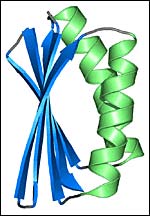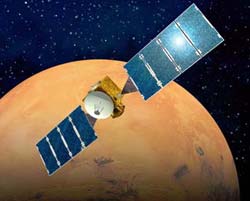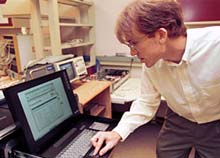ESA’s Mars Express probe is scheduled to arrive at Mars at Christmas : the Beagle 2 lander is expected to touch down on the surface of the Red Planet during the night of 24 to 25 December.
Launched on 2 June 2003 from Baikonur (Kazakhstan) on board a Russian Soyuz operated by Starsem, the European probe – built for ESA by a European team of industrial companies led by Astrium – carries seven scientific instruments that will perform a series of remote sensing experiments designed to shed

Using sophisticated computer algorithms running on standard desktop computers, researchers have designed and constructed a novel functional protein that is not found in nature. The achievement should enable researchers to explore larger questions about how proteins evolved and why nature “chose” certain protein folds over others.
The ability to specify and design artificial proteins also opens the way for researchers to engineer artificial protein enzymes for use as medicines or industrial c
Ultimate goal: a public online database
A computational technique used to predict everything from books that a given customer might like to the function of an unknown protein is now being applied by MIT engineers and colleagues to the search for new materials.
The team’s ultimate goal: a public online database that could aid the design of materials for almost any application, from nanostructure computer components to ultralight, high-strength alloys for airplanes.

Europe’s mission to the Red Planet, Mars Express, is on schedule to arrive at the planet on Christmas Day, 2003.
The lander, Beagle 2, is due to descend through the Martian atmosphere and touch down also on 25 December.
Mars Express is now within 20 million kilometres of the Red Planet and the next mission milestone comes on 19 December, when Mars Express will release Beagle 2. The orbiter spacecraft will send Beagle 2 spinning towards the planet on a precise trajectory.

Scanning all of Shakespeare in 1/60th of a second
A computer scientist at Washington University in St. Louis has developed technology to stop malicious software – malware – such as viruses and worms long before it even has a chance to reach computers in the home and office.
John Lockwood, Ph.D., an assistant professor of computer science at Washington University, and the graduate students that work in his research laboratory have developed a hardware platform called the Fiel
Show that little sleep for a short period improves some simple tasks
Lack of sleep can affect an individual’s memory, ability to perform simple daily tasks, and attention span. Recent studies that help decipher the basic mechanism of sleep may help in the development of drugs that reduce the need for sleep in military combat or other circumstances.
In other research, investigators have found that sleeping only a few hours a night over a long period of time impairs memor